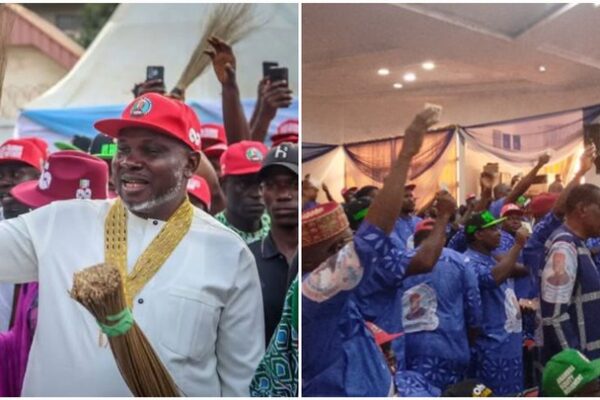Massive Endorsements, ₦150 Million Fundraising Mark Turning Point in Guber Race In what analysts are calling a major shift in Anambra’s political dynamics, over 32,000 members of the All Progressives Grand Alliance (APGA) have defected to the All Progressives Congress (APC) in support of Prince Nicholas Ukachukwu, the party’s governorship candidate for the November 8, 2025, election. The unprecedented mass defection occurred during a mega rally and thanksgiving event hosted by the Sustenance of Faith in Governance (SOFIG) Family—popularly known as the Ikwukuoma SOFIG Family—marking its sixth anniversary on Saturday. The event drew thousands of party supporters, political stakeholders, and grassroots mobilizers from across the state. Addressing the enthusiastic crowd, Prince Ukachukwu, fondly called Ikwukuoma, expressed deep gratitude to the SOFIG movement for its unreserved endorsement and support. “This is the first time I’ve received such overwhelming support without anyone asking for a single kobo,” Ukachukwu said. “SOFIG has invested in this journey with faith, love, and commitment. This isn’t politics as usual—it’s a divine movement rooted in family, community, and vision.” He pledged to usher in a new era of people-focused, integrity-driven governance, promising to build political leadership from the grassroots to the statehouse. “Within this crowd are tomorrow’s councillors, local government chairmen, and Assembly members,” he added. “We are laying the foundation for a new political future.” Senator Ekwunife Declares Ukachukwu “Anambra’s Needed Leader” Deputy governorship candidate, Senator (Iyom) Uche Ekwunife, described Ukachukwu as a visionary leader capable of transforming Anambra. “The time is ripe. Prince Nicholas is trustworthy, God-fearing, and ready,” she stated. “Our victory must start at the ward level and spread across all 901 wards of Anambra Central and beyond.” She praised SOFIG founders Dr. (Bar) Kingsley Ezekwelu and Dr. Kenneth Ezekwelu for creating what she called “one of Nigeria’s most impactful political platforms.” ₦150 Million Boost for Campaign SOFIG National President, Dr. Kingsley K. Ezekwelu, Esq., formally endorsed Ukachukwu and Ekwunife, announcing a ₦150 million donation to the campaign. “We are more than 35,000 members strong, including 32,000 defectors from APGA today,” Dr. Ezekwelu said. “This is more than an endorsement—it’s a mission. We are ready to win this battle with our PVCs.” APC Welcomes New Members APC State Chairman, Chief Basil Ejidike, welcomed the new members, describing the day as a “historic milestone.” “With Prince Ukachukwu, APC is poised to deliver the long-awaited transformation in Anambra. The tides are turning—and SOFIG has shown us the way,” he said, while donating ₦2 million to SOFIG on behalf of the party. Financial Powerhouses Fuel Campaign Momentum The rally also featured a significant financial show of force: As the 2025 polls draw closer, Saturday’s event signals a strong and coordinated push by the APC and its supporters to challenge APGA’s longstanding dominance in Anambra politics.









